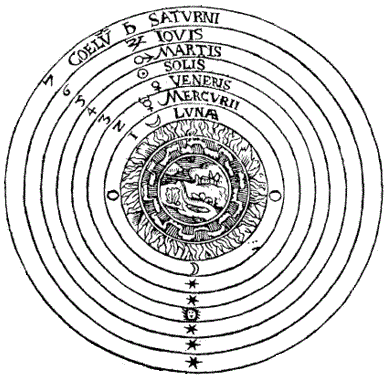The Moon is in Gemini this morning, applying to a trine of Mercury and then square with Neptune.
Today I’ll field another question from a reader that has popped up several times recently, also from several of my students. The question is simple, “Why do some astrologers only use seven planets rather than including all the modern and newly discovered planets and asteroids, etc?”
As someone who used to be perplexed by the same question I feel like I can speak to this question very personally. It even used to make me angry to think that some astrologers were out there only using the traditional seven, as if it were sheer ignorance of the much vaster reality of cosmos and psyche. I now see the issue much differently, and though I don’t speak for all astrologers on the subject, here are some of my thoughts.
I’ve been using mostly the traditional seven planets for almost a year now, and I have nothing against the outer planets or minor planets. My own use of the traditional seven doesn’t derive from any inherent dislike or disrespect toward them or their use or people or schools who really focus on their importance in contrast to traditional schools or vice versa. My own use of the traditional seven (Sun, Moon, Mercury, Venus, Mars, Jupiter, and Saturn) stems from the fact that I’ve been immersing myself in traditional forms in order to learn them and in order to astrologize in a different way. To me, astrology is an activity, a verb not a noun, and I think it’s a deception to think that either more or less planets standing in as symbols in the act of astrologizing is what indicates how “true” astrology is as a field of inquiry or spiritual activity. So my first answer is just that. I think successful, deeply meaningful, spiritual, and soulful astrology can be done through many different forms of astrology that utilize more or less planets or symbols. In some ways I see these differences like the literary art forms I studied in graduate school. Some writers are minimalists, they use fewer words, and they say far more about the unconscious or the nature of life as a result. Some writers are flowering word smiths and yet similar results are achieved; we see deeper because of richer or more elaborate descriptions. One thing I know is that artists don’t accomplish much when we sit around discussing which form is “truer,” and for the most part I don’t think astrologers do either. Instead we should talk about the way in which the use of particular forms illuminate some things while leaving out others. And good astrologers, like good artists, should have an appreciation for a diversity of forms. So I see different forms of astrology like different forms of art. The forms we are attracted to are reflections of what we find beautiful, what we find interesting, what we find important. They are each putting forth something positive insofar as they are putting forth coherent forms of astrology in the first place (forms that speak truth to the soul). What gets us into trouble is thinking that more or less planets or symbols in a chart is primarily what determines how truthful, useful, healing, or beautiful a certain form is.
To me, the use of the traditional seven planets has been like finding an aesthetic or archetypal home as an astrologer. It has far less to do with the “truth” of the outer planets, in other words, and far more to do with the beauty I am finding in the traditional seven, along with the classical language and the classical models of delineation. In this sense I am still archetypally transparent about the inescapable/subjective nature of archetypes that twist the “clear lines”of “TRUTH” we think we have whenever we think we have a pure or straight or tidy sum at our fingertips. But by the same token, I see it as a mistake to assume that the use of the modern planets and endless minor aspects or asteroids or modern psychological theory is somehow superior simply because it is a negation of the old. To me this would be like saying that classical music has no place or value just because rock n roll came about last century. Progress is just as tempting a delusion as the worship of the past!
I think of my favorite psychologist and archetypal genius, James Hillman. In an essay he wrote called “Back to Beyond: On Cosmology,” he wrote about the purpose of metaphysics for the life of the soul. He wrote that too often people pit metaphysical truth against human truth, or subjective/personal truths, as though to know the truth about God or the Universe (metaphysics) takes us to a cleaner or higher or straighter level of knowledge than the knowledge of some lower, human, crooked, psychological, relative, or subjective level (earth!). Similarly, astrological progressivists, whether locating their astrology in the past or in the modern/future, will claim that one system of astrology, one use of the planets versus another, is cleaner/straighter, and less prone to the relativistic traps or subjective/earthly snares. Astrologers who worship the past claim that the system is more “objectively” true, while astrologers who worship the future claim that the outer planets are more “objectively” true, in terms of reflecting more of the cosmos and more of divine knowledge, “as it really is.” Not all of this is bad. Even Hillman (who was not a fan of metaphysics generally) wrote in his essay on cosmology that the soul craves a sense of ultimate meaning, or models of supreme unification. However, for Hillman, the action of metaphysics was more important than which particular theory we held. He wrote, “During the Renaissance, in alchemy, the art of memory, and astrology–thick-crusted things, things gray and dull, wintry, or living in isolated places, belonged to Saturn, as did laconic speech, a mathematical turn of the mind, measuring tools, and so on. All “things,” whether styles of mind, diseases, foods, geographies, or animals, found location according to their qualities. Everything had shelter and altar. Nothing was lost; everything belonged to a cosmos because it belonged somewhere as image to the planetary persons and their myths. This emphasis on descriptive qualities gives back to cosmology its original aesthetic meaning. We have lost that first sense of the word. Cosmos now means empty, vast, spacey–a video game for astronomers. The Greek word meant orderly, becomingly, duly, an aesthetic arrangement. Cosmos once reffered to the anima mundi, world-soul, an Aphroditic order. And our word “cosmetics,” referring to the facial appearance of things, brings to light this original sense. So, besides its astronomical and metaphysical meanings, cosmology implies even more fundamentally an aesthetic world whose essence is constituted in sensory images. Attempts to reduce the account of the world to the fewest coherent principles, even to mathematical formulae, have the intention of revealing by means of scientific elegance this cosmic beauty.”
What Hillman is saying is that the purpose of a metaphysic is to provide meaningful, soulful, and beautiful order to the world we live in, complete with all the facets of life that we experience in our day to day lives. As Hillman goes on to write, “Knowledge becomes gnosis when things and experiences, by virtue of their being known, suggest their subtle bodies in the Anima Mundi. Rather than abstracting us from the world, knowing takes us more directly into its soul as aesthetic presentation. The way to see the Gods is to know the world. Practical knowledge, common sense, therefore cannot be divided from metaphysical knowledge….metaphysics becomes the praxis of an essentially lived life in which being, substances, method, order, and other traditional topics of metaphysics become qualities of soul.
So if this “seeing things as they are in essence,” from within the sphere of phenomenal life on earth, is the common goal of astrologers and astrological metaphysicians, then we have to ask ourselves if we really believe this is achieved solely through how many planets we use, or what house system, or whatever other methods? Henry Corbin suggested that the circumcision of the heart, which leads to the perceiving of these essences in phenomenon, does not come from philosophy or science, from books or authorities, but through angels and daimones, who give to us the task of exegesis..of explaining what we have seen in the symbolic language of the heavenly realms, until the exegesis becomes less an act of interpretation and more the actual act of seeing itself.
As Hillman wrote, “We learn their truth as witnesses and bring recitations, dramatic accounts, of what has been seen and heard. After descents and flights “out of the world” by means of disciplined imagining activities–oneself the subject of an exegesis, being led out by an angel…the world becomes transparent, the beyond here…”
The key phrase for me in Hillmans statement is “by means of disciplined imagining activities.” And “by means of” is just as important as “disciplined imagining activities” in that sentence. The use of the seven planets for me has become the disciplined imagining activity. The classical language is rich, mythic, archetypal, deeply spiritual, metaphysical, far richer than what most modern astrologers believe it to be (not having examined it with something like a daimon or angelic guide), and it is also rigorous and disciplined in much the same way disciplined forms of breathing, meditation, or exercise are disciplined. For me it’s been a stronger discipline in this regard, but I haven’t lost touch with the “by means of” that Hillman mentions, echoing Corbin’s writings on the guidance of the daimon in our lives, taking us through these various imaginative disciplines towards a universal form of spiritual vision..a vision that is at once “here” while simultaneously “sitting atop the cosmos.”
To me, like a form of music, I love love love the classical language of astrology. It is the language my daimon is showing me its love for me as I love what it loves. The work for any astrologer is to make sure that our language stays alive, just as fluid as a composer who cannot stop writing and making music. When language dies, angels die. As Hillman once wrote, “Words are angels. Hosana! Hosana means both save (an appeal for deliverance) and praise (a shout of adoration). A cosmology that saves the phenomenon adores them.” And I believe the saving and adoring of all phenomenon, the vision to see as the creator sees, is facilitated by a variety of symbolic languages. Our angels lead us to them, teach us to see through them by making our lives their interpretation, and then by means of their rigor, we learn to speak life, truth, hope, and beauty, to the soul. Fewer words or fewer planets, or more, is missing the point…and the life giving power of astrological language start to die like wilting flowers before our distracted mouths when we go down this road.
It took me a lot of words to say all of this…so to some of my concerned readers and students, don’t be disappointed that I don’t use more planets and more aspects and more minor planets at this time…there’s an entire universe in a grain of sand, and just as frequently as we cut things out unnecessarily, too little is said using too much.
Prayer: lead us by means of disciplined imagining activities













